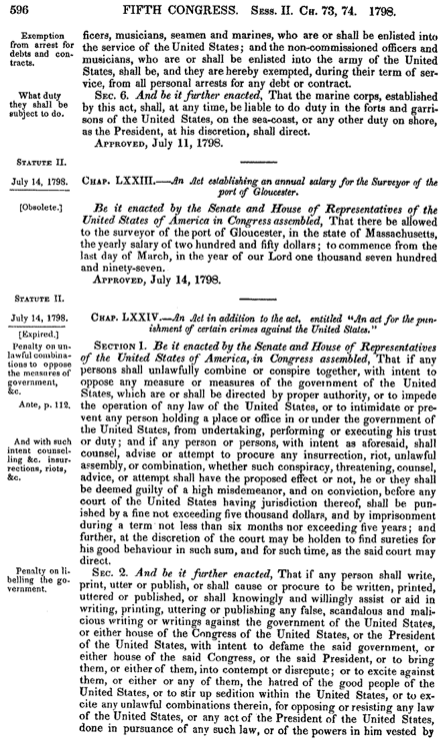The Alien and Sedition Acts were four bills that were passed by the Federalists in the 5th United States Congress and signed into law by President John Adams in 1798, the result of the French Revolution and during an undeclared naval war with France, later known as the Quasi-War. Authored by the Federalists, the laws were purported to strengthen national security, but critics argued that they were primarily an attempt to suppress voters who disagreed with the Federalist party.
The Naturalization Act increased the residency requirement for American citizenship from 5 to 14 years. The Alien Friends Act allowed the president to imprison or deport aliens considered “dangerous to the peace and safety of the United States” at any time, while the Alien Enemies Act authorized the president to do the same to any male citizen of a hostile nation, above the age of 14, during times of war. (At the time, the majority of immigrants supported Thomas Jefferson and the Democratic-Republicans, the political opponents of the Federalists.) Lastly, the controversial Sedition Act restricted speech which was critical of the federal government.
The acts were denounced by Democratic-Republicans and ultimately helped them to victory in the 1800 election, when Thomas Jefferson defeated the incumbent President Adams. The Sedition Act and the Alien Friends Act were allowed to expire in 1800 and 1801, respectively. The Alien Enemies Act, however, remains in effect as 50 USC Sections 21–24. During World War II, it was used to detain, deport and confiscate the property of Japanese, German, Italian, and other Axis nation citizens residing in the United States.
The Sedition Act
Section 1. Be it enacted by the Senate and House of Representatives of the United States of America, in Congress assembled, Penalty on unlawful combinations to oppose the measures of government, &c.
Ante, p. 112.That if any persons shall unlawfully combine or conspire together, with intent to oppose any measure or measures of the government of the United States, which are or shall be directed by proper authority, or to impede the operation of any law of the United States, or to intimidate or prevent any person holding a place or office in or under the government of the United States, from undertaking, performing or executing his trust or duty; And with such intent counselling &c. insurrections, riots, &c.and if any person or persons, with intent as aforesaid, shall counsel, advise or attempt to procure any insurrection, riot, unlawful assembly, or combination, whether such conspiracy, threatening, counsel, advice, or attempt shall have the proposed effect or not, he or they shall be deemed guilty of a high misdemeanor, and on conviction, before any court of the United States having jurisdiction thereof; shall be punished by a fine not exceeding five thousand dollars, and by imprisonment during a term not less than six months nor exceeding five years; and further, at the discretion of the court may be holden to find sureties for his good behaviour in such sum, and for such time, as the said court may direct.
Sec. 2. And be it further enacted, Penalty on libelling the governmentThat if any person shall write, print, utter or publish, or shall cause or procure to be written, printed, uttered or published, or shall knowingly and willingly assist or aid in writing, printing, uttering or publishing any false, scandalous and malicious writing or writings against the government of the United States, or either house of the Congress of the United States, or the President of the United States, with intent to defame the said government, or either house of the said Congress, or the said President, or to bring them, or either of them, into contempt or disrepute; or to excite against them, or either or any of them, the hatred of the good people of the United States, or to stir up sedition within the United States, or to excite any unlawful combinations therein, for opposing or resisting any law of the United States, or any act of the President of the United States, done in pursuance of any such law, or of the powers in him vested by the constitution of the United States, or to resist, oppose, or defeat any such law or act, or to aid, encourage or abet any hostile designs of any foreign nation against the United States, their people or government, then such person, being thereof convicted before any court of the United States having jurisdiction thereof, shall be punished by a fine not exceeding two thousand dollars, and by imprisonment not exceeding two years.
Sec. 3. And be it further enacted and declared, Truth of the matter may be given in evidence.
The jury shall determine the law and the fact, under the court’s direction.
Limitation.That if any person shall be prosecuted under this act, for the writing or publishing any libel aforesaid, it shall be lawful for the defendant, upon the trial of the cause, to give in evidence in his defence, the truth of the matter contained in the publication charged as a libel. And the jury who shall try the cause, shall have a right to determine the law and the fact, under the direction of the court, as in other cases.
Sec. 4. And be it further enacted, That this act shall continue and be in force until the third day of March, one thousand eight hundred and one, and no longer: Provided, that the expiration of the act shall not prevent or defeat a prosecution and punishment of any offence against the law, during the time it shall be in force.
Approved, July 14, 1798.
Candela Citations
- Alien and Sedition Acts. Provided by: Wikipedia. Located at: https://en.wikipedia.org/wiki/Alien_and_Sedition_Acts. License: CC BY-SA: Attribution-ShareAlike
- United States Statutes at Large/Volume 1/5th Congress/2nd Session/Chapter 74. Provided by: Wikisource. Located at: https://en.wikisource.org/wiki/United_States_Statutes_at_Large/Volume_1/5th_Congress/2nd_Session/Chapter_74. License: Public Domain: No Known Copyright

